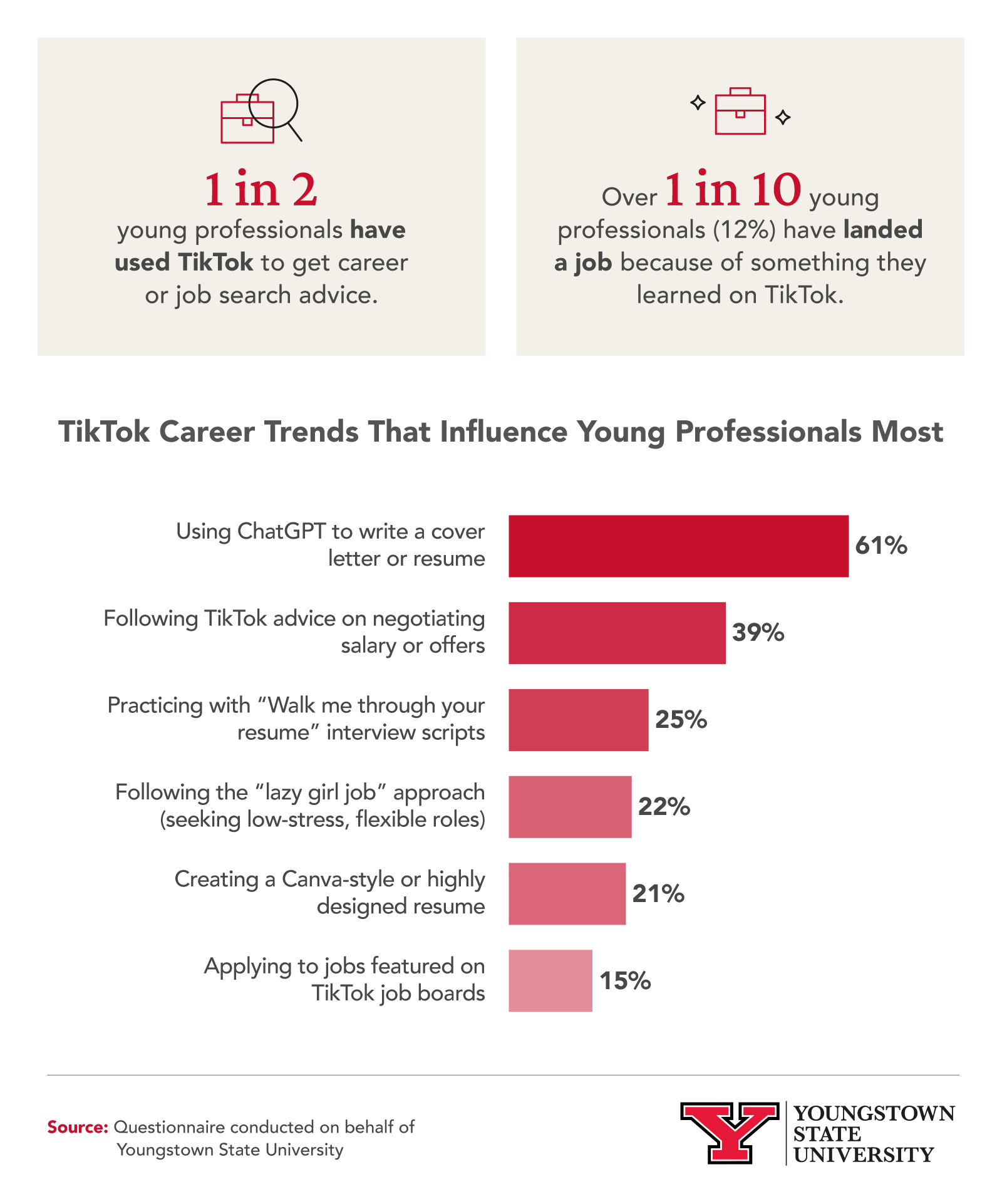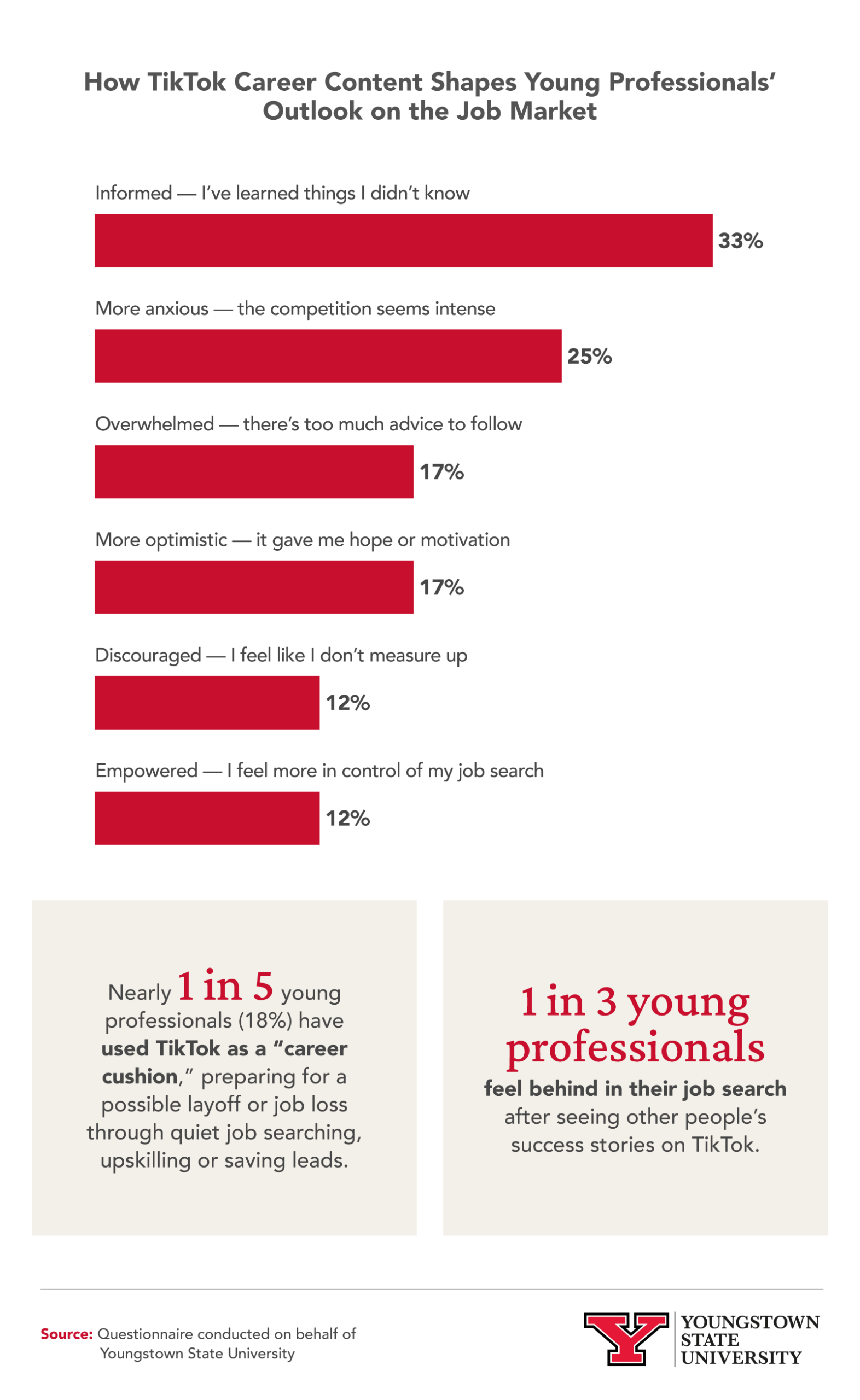
For many young professionals navigating today’s job market, career guidance isn’t coming from books or even college career centers. It’s coming from TikTok. With advice that ranges from resume hacks to unconventional job-hunting strategies, the app is increasingly serving as a career coach.
To better understand how this platform is reshaping the job search, a questionnaire was conducted on behalf of Youngstown State University (YSU) among 1,000 millennial and Gen Z professionals. Learn how social media is influencing hiring outcomes and quietly becoming an educational force in early career development.
Key Takeaways
- One in two young professionals (50%) have used TikTok to get career or job search advice.
- Over one in 10 young professionals (12%) have landed a job because of something they learned on TikTok.
- Nearly one in five young professionals (18%) have used TikTok as a “career cushion,” preparing for a possible layoff or job loss through quiet job searching, upskilling or saving leads.
- One in three young professionals (33%) feel behind in their job search after seeing other people’s success stories on TikTok.
- Over one in three young professionals (34%) feel pressured to “aestheticize” their job search with polished resumes or curated LinkedIn posts.
How Young Professionals Use TikTok to Get Ahead
TikTok isn’t just for trends and entertainment. Many users are turning to the platform for actionable job advice. Here’s how younger generations are putting TikTok career tips into practice.

Two-thirds of Gen Z young professionals (66%) said they’ve used TikTok for career or job search advice, compared to fewer than half of millennials (43%). In total, 50% of young professionals reported turning to the platform for career-related content.
Nearly half of young professionals (45%) felt confident using job advice they found on TikTok, and for many, it paid off. Over one in 10 (12%) have landed a job because of something they learned on TikTok. Among them, 50% said it was in the same field, 44% in a new field and 10% said it was their very first job.
Professionals across industries are also tapping into TikTok. More than half in tech (54%) and healthcare (53%) said they’ve used the app for job or career advice, along with 47% in education. Nearly one in four tech professionals (24%) and 8% in healthcare reported landing a job because of something they learned on the platform.
Many job seekers are taking what they learn and putting it directly into practice. Nearly one in three young professionals (30%) have modified their resumes based on TikTok content. To find that content, they’re turning to specific hashtags. The most helpful ones were #jobsearch (43%), #resumetips (41%), #careertok (36%), #interviewtips (33%) and #jobtok (30%).
While some might worry about unreliable advice, most respondents had no regrets. Sixty-four percent said TikTok career content had never backfired, 28% were neutral and only 8% reported a negative outcome.
TikTok’s Role in Career Resilience and Mental Health
TikTok is influencing not only what young professionals do during a job search but also how they feel about it. For many, the platform has become both a support system and a source of pressure.

Nearly one in five young professionals (18%) said they used TikTok as a “career cushion,” using content to quietly prepare for layoffs or job changes by upskilling, saving leads or searching in secret. Twenty-five percent of tech professionals reported career cushioning through TikTok, along with 16% in healthcare and 15% in education.
For some, watching others succeed has had a downside. One-third of young professionals said that seeing other people’s job updates made them feel behind in their own search. That feeling was especially strong in healthcare (33%), followed by 28% in education and 24% in tech.
More than one in two young professionals (51%) believed most career advice on TikTok was overly curated and unrealistic. Nearly one in 10 (8%) even took a break from the platform because of job-search burnout.
At the same time, the pressure to present a perfect journey is real. Thirty-four percent of young professionals felt pressured to “aestheticize” their job search, using polished resumes or curated LinkedIn posts. Separately, nearly one in four (24%) said they felt pushed to publicly perform their search by posting updates, wins or job offers online.
When it comes to trusted sources for career guidance, young professionals are most likely to lean on established platforms and personal networks. Nearly half (48%) said they trust LinkedIn the most for job search advice, followed closely by online job boards like Indeed and Glassdoor (44%).
Many are also turning to communities and peers, with 37% relying on Reddit for candid insights, and 36% looking to friends or peers for guidance. Fewer place their trust in formal career coaches or mentors (20%), AI tools (18%) and TikTok (16%).
A New Form of Career Education
TikTok may not be a traditional classroom, but for many young professionals, it’s a place to learn, reflect and adapt. From resume revisions to mental health coping strategies, career content on the platform is shaping how Gen Z and millennials approach the job market. While some advice may be overly curated, the overall impact shows that informal learning through social media is helping early-career workers gain confidence and clarity in a changing world of work.
Methodology
A questionnaire of 1,000 young professionals was conducted on behalf of YSU to explore how TikTok has transformed into a career coach. The average age of respondents was 32; 56% were women, and 44% were men. Generationally, 70% were millennials, and 30% were Gen Z. Due to rounding, some percentages in this study may not total 100% exactly.
Respondents represented a mix of industries, experience levels and geographic regions. They were asked about their use of TikTok for career and job search purposes, including behaviors such as seeking advice, modifying resumes, applying to jobs and “career cushioning,” as well as their perceptions of the platform’s influence on confidence, burnout and job market outlook.
This is a non-scientific, exploratory questionnaire designed to explore behavioral and attitudinal trends. While the findings provide valuable insight into how TikTok is shaping job search behaviors and perceptions, the sample size and self-reported nature of the questionnaire limit broader generalizations. Results should be interpreted as directional, offering a timely snapshot of emerging trends that can inform further study, career development resources and discussions about the role of social media in the job search process.
About Youngstown State University
Youngstown State University helps today’s professionals prepare for tomorrow’s career opportunities through its online Master of Science in Education (M.S.Ed.) degree programs. These flexible programs are designed to give educators and professionals the tools they need to adapt, grow and lead in an evolving job market. With an online M.S.Ed. degree, students gain practical knowledge, career-ready skills and the confidence to pursue meaningful opportunities in education and beyond.
Fair Use Statement
Noncommercial repurposing of this content is encouraged. When sharing, please link back to this Youngstown State University page as the original source.


